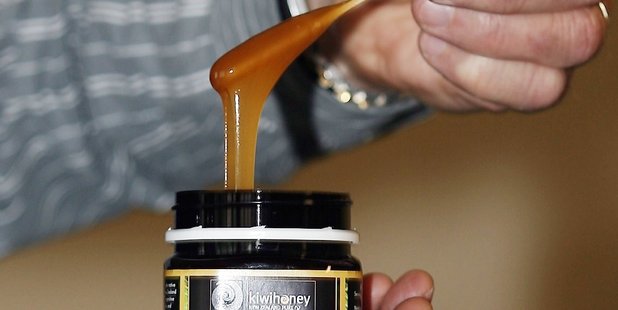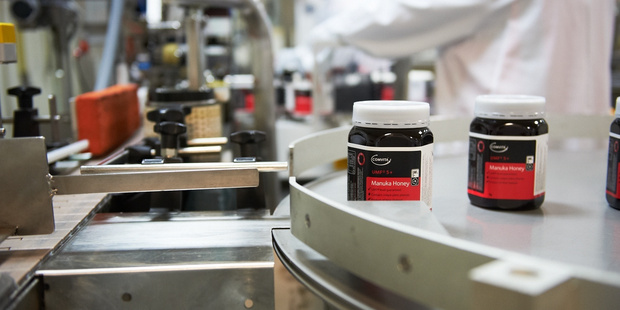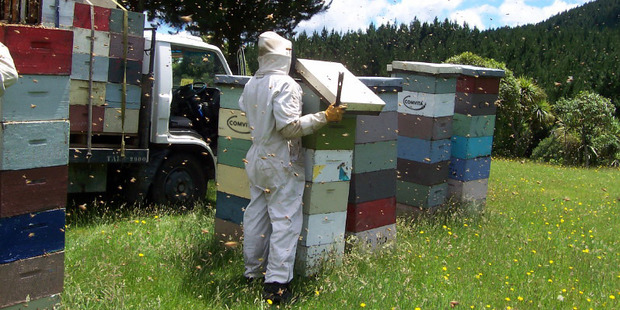There's gold in them thar hills By Laurel Stowell 2:46 PM Tuesday Apr 26, 2016
Add a comment

BOOM TIME: The price of manuka honey is soaring upward and beekeepers are looking to cash in.
BIG HONEY businesses are buying up marginal rural land in the Whanganui region, rural real estate specialist Knuk Bukholt says. And the manuka honey boom - with wholesale prices upward of $26/kg for top grade honey - is driving up the per hectare price. Beekeepers buy the land to lock it up to protect the nectar supply for their bees. Values have more than doubled in some cases - land with native bush and punga sells for about $1200/ha, whereas accessible manuka scrubland has been fetching as much as $3000/ha.
The biggest honey operators in the region are Tweeddale Apiaries, based in Taihape, Watson and Son, based in Masterton, Comvita/KiwiBee which has a base in Whanganui's Paul's Rd but started in the Bay of Plenty and Henry Matthews in the Waitotara Valley with a leased commercial property in Whanganui's Heads Rd. Conchita Tweeddale, of Tweeddale Apiaries, said the business was in the process of negotiating to buy three more properties.
Popular areas are the Waitotara, Ahuahu and Kauarapaoa valleys, and the Waverley backcountry, Mr Bukholt said. The higher prices have been a godsend for some sellers.
"It's all that marginal country, which you would struggle to farm viably. It has been cheaper and young people have gone in and struggled." One property, Puketotara Station in the Ahuahu Valley, sold about three years ago for a figure in the millions. It was bought by a big apiary business. "No one else could afford that," Mr Bukholt said.
Continued below.
Related Content
Comvita will pay a second interim dividend of 10 cents per share on June 24, taking the total for the 12-month period to 16 cents, ahead of 13 cents a year earlier. Photo / Bay of Plenty Times
Comvita profits jumps 68pc as Aust becomes largest market
Comvita is currently trading at $12, having gained 43 per cent this year.
Comvita price target raised at Craigs on Australian, Asian growth prospects
The honey boom has helped big apiaries get bigger.
Tweeddale Apiaries started in Taihape in 1945 with 300 hives. Now it has 20,000 - with about 12,000 in the Taumarunui area and the rest spread across Whanganui and the Rangitikei.
It produced 750,000kg of honey last year - 300,000kg of manuka and manuka blend and 350,000kg of clover honey. The manuka honey is sent away for testing, then offered to buyers in a tender process.
The business is still expanding, Mrs Tweeddale said. It could grow to 43 beekeepers, most living in accommodation the family owns in Taihape. Five new beekeepers are expected from the Philippines, and more are being sought locally.
They are trained by her husband Don, and Whanganui beekeeper Neil Farrer said his training was second to none. "There's only one standard. It's very high and it's very good." The biggest limit to the growth of their business was keeping good beekeepers, Mrs Tweeddale said. Her husband's training was so good other apiarists "pirated" their staff by making them better offers.
Where there's big money there is often a criminal element. The Tweeddales have had 31 hives stolen, and can't claim insurance on them.
Mr Farrer knows of 100 hives stolen in the Whanganui area in the last six months, and said some thieves were taking out honey frames and leaving hives behind.
He's also worried all the hives out in the backcountry will be brought closer to town for the winter to be looked after. When that happens there will be overcrowding, with the risk of bee diseases being spread. There are other factors that could also take the gloss off the honey industry, he said.
One was the influx of inexperienced beekeepers who don't know the law about hive registration, or how to watch out for and treat bee disease.
Another was overseas sales of fake manuka honey, adulterated with sugar, putting off foreign buyers.
And some who have joined the "gold rush" don't know manuka flowering is fickle, with one or two really good seasons every 10 years. This year was not a good season, because rain, cold and wind limited the nectar produced during flowering. "Older beekeepers know this and work accordingly, but the new chums have no idea." - Wanganui Chronicle http://www.nzherald.co.nz/wanganui-chronicle/news/article.cfm?c_id=1503426&objectid=11628889
| 

